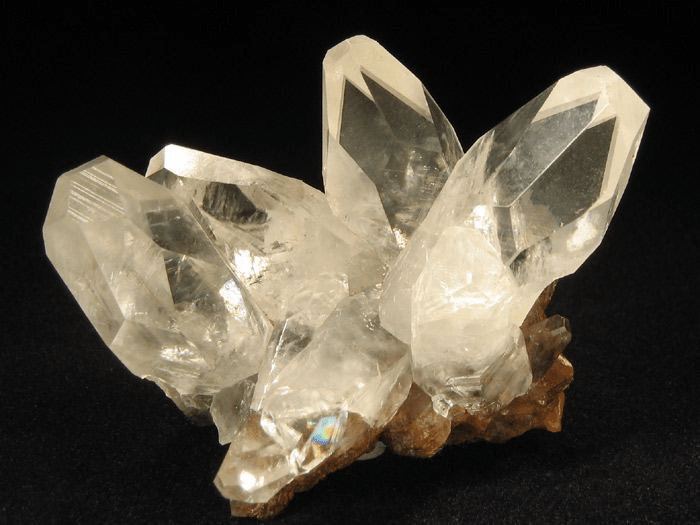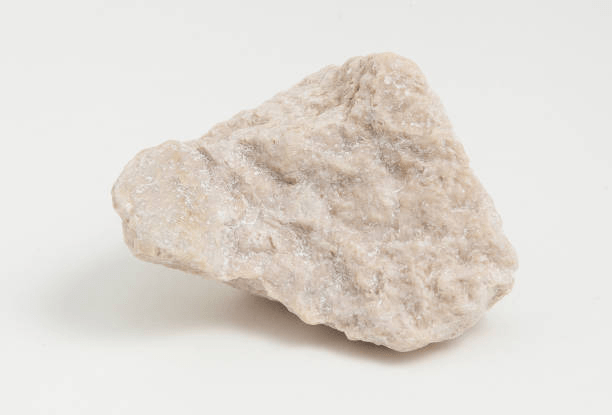Does this mineral show cleavage or fracture?
Cleavage, smooth flat breaks
What is the difference between extrusive and intrusive igneous rocks? (where, cooling, crystals)
Extrusive rocks form on the surface, cool quickly and have small crystals.
Intrusive rocks form underground, cool slowly, have large crystals.
What are the factors that contribute to metamorphism
Temperature and Pressure
What are the three types of sedimentary rocks?
Clastic (sediments),
Crystalline (chemical),
Bioclastic (dead plants/animals)
Describe the differences between the continuous and discontinuous series on Bowen's reaction series
Discontinuous changes the mineral as the temp cools but the continuous mineral stays plagioclase as it cools.
Describe the luster of this mineral.
Nonmetallic; specifically earthy or dull
Which igneous rock is more dense. Felsic or Mafic
Mafic rocks
What geological process will form REGIONAL metamorphism
Plate tectonics
What is the processes are involved for a clastic rock to form?
Weathering and Erosion, Deposition, Burial, Compaction, lastly Cementation
Using the reference table, describe with the appropriate terms (rock cycle processes), how a rock moves from magma to a sedimentary rock.
Magma cools into an igneous rock, then is *probably uplifted*, weathered and eroded into sediments, deposited, and finally compacted or cemented into a sedimentary rock.
Name two of the six special characteristics that can be used to identify minerals.
Odd texture, smell, fluorescence, fizzes with acid, taste, magnetism
What does it mean to have vesicular texture?
It has holes/gas pockets
What is banding in metamorphic rocks?
Alternating layers of light and dark.
What do bioclastic (organic) rocks form from?
Once living things, like animals and plants.
What ELEMENTS are common in felsic rocks and mafic rocks
Felsic- Silicon, Potassium and Sodium
Mafic- Iron, Magnesium and Calcium
Why do minerals form in specific shapes. For example. why does micas form in a "platy" shape or pyrite in a cubic shape?
Their chemical composition aligns them in a specific way, not randomly.
What does color have to do with igneous rocks?
Light color is felsic, grey intermediate and dark mafic.
Which metamorphism occurs when lava squeezes through bedrock as it frees itself from the mantle?
Contact Metamorphism
Name any sedimentary rock that can be chemically formed (crystalline)
Rock Salt, Rock Gypsum, Limestone, Dolostone, Chert
What kind of minerals can be found in diorite?
Quartz, Plagioclase feldspar, Muscovite, Biotite, Amphibole and Pyroxene.
Using the reference table, name a special characteristic of the mineral Talc
Soapy feel, VERY soft.
What processes form an igneous rock? (rock cycle terms!)
Melting, Cooling and solidifying, Outgassing/volcanism
What is the difference between foliated and non-foliated rocks?
A foliated metamorphic rock has a visible layered or banded appearance due to the alignment of minerals under pressure, while a non-foliated metamorphic rock lacks this layered structure and has a more uniform texture
What differentiates clastic rocks from one another?
The size of the clast. i.e conglomerate=cobbles, sandstone=sand, shale=clay
Using the reference table, describe what needs to occur before crystalline sedimentary rocks form.
Gasses and salts dissolve in solution and minerals precipitate down. The water will evaporate away then lithification happens